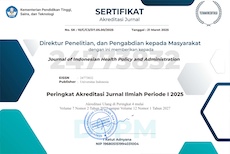Abstract
Health is one of the fundamental rights for every person, therefore it must be provided by the government. To guarantee the quality and type of health services, the Minimal Standards for Services (SPM) must be established. This includes the SPM for the productive age healthcare services (SPM BKUP). This type of healthcare is important since it covers about 60-70% of the current population. In this research, we analyzed the discrepancy between the reality and the ideal in the implementation of the SPM BKUP qualitatively through in-depth interviews, focus group discusions, and studying the related documents. We discovered that in Depok City 10 of the 13 indicators for implementation were incomplete. These were the Noncommunicable diseases (NCDs) risk factor conseling, technical trainings for the screening officer and web-based surveillance, NCDs integrated services, recording and reporting, monitoring and evaluation, communication, the attitude of the implementer, manpower, facilities, and funding. And that the other three indicators, incentives for the implementers that reached the target, standard operational procedures for the implementation of the SPM BKUP, and a specialized team for the implementation. Therefore, Depok City was only minimally prepared to implement the SPM.
Bahasa Abstract
Kesehatan adalah hak yang sangat mendasar bagi manusia, untuk itu negara harus hadir dalam pemenuhannya. Dalam era otonomi daerah, Standar Pelayanan Minimal (SPM) bidang kesehatan menjadi jaminan penyelenggaraan pelayanan kesehatan dengan jenis dan mutu pelayanan dasar yang sama. Salah satu jenis layanan dasar adalah SPM bidang kesehatan pada usia produktif (SPM BKUP). Jenis layanan dasar ini bernilai strategis bagi kinerja Pemerintah Daerah, karena berdasarkan BPS (2017) komposisi penduduk usia produktif menempati proporsi 60- 70% dari seluruh jumlah penduduk dan nilai strategis bagi pengendalian Penyakit Tidak Menular (PTM) karena bentuk skrining. Analisis kesiapan ditujukan untuk melihat seberapa besar jarak antara kondisi ideal dengan kenyataan yang sebenarnya. Penelitian ini menggunakan metode kualitatif dengan teknik WM, FGD dan telaah dokumen terkait. Hasil penelitian didapatkan 10 dari 13 indikator kesiapan implementasi, belum lengkap dimiliki Kota Depok, meliputi konseling faktor risiko PTM, Pelatihan teknis petugas skrining dan surveilans berbasis web, pelayanan terpadu PTM, pencatatan pelaporan, monitoring evaluasi, komunikasi, sikap pelaksana, ketersediaan SDM, fasilitas dan dana. Sementara 3 indikator yang belum sama sekali dimiliki yaitu insentif bagi pelaksana yang mencapai target, SOP pelaksanaan SPM BKUP dan Tim penanggung jawab penyelenggaraan SPM BKUP. Kesimpulan didapatkan bahwa Kota Depok memiliki kesiapan yang minimal dalam rangka implementasi SPM BKUP.
Recommended Citation
Zakiah, Zakiah and Junadi, Purnawan
(2019)
"AN ANALYSIS ON THE PREPAREDNESS FOR IMPLEMENTING THE MINIMAL STANDARDS FOR SERVICE IN THE HEALTH FIELD AT DEPOK CITY IN 2017,"
Journal of Indonesian Health Policy and Administration: Vol. 4:
No.
1, Article 4.
DOI: 10.7454/ihpa.v4i1.2000
Available at:
https://scholarhub.ui.ac.id/ihpa/vol4/iss1/4




